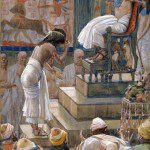
Regardless of what you think about evolution, it poses a problem. In the past, the issue might have been framed as “since we know scripture is true, the science behind evolution must be false. How do we make sense of this?”
Today, the hypothetical teenager might wrestle with this question from the other side. “Since we know human evolution is true, and God knows all truth, why don’t God’s earthly proxies like scripture and prophets seem to know it?”
This is actually a much larger problem than just evolution; what do prophets know and how do they know it? What can we reasonably expect prophets to know through their prophetic office? And why am I not bothered that prophets don’t know X, or have preached Y which is “obviously” “wrong”?
Mormons put heavy emphasis on revelation, prophets, and scripture… but we’ve never elaborated on what those things mean, hammered out how they work, their limits and mechanics. We don’t have a user’s manual. To our collective detriment, I think, LDS tend to fill in those gaps from cultural osmosis, conservative Protestantism, and inherited assumptions.
See, people want prophets to serve as an immediate shortcut to eternal absolute Truth; this rhetorically elevates revelation completely over human reason, wisdom, and science. And there’s an aspect to that which is accurate enough; God does speak to prophets through revelation. But it does not follow that what prophets speak under inspirat ion is God’s pure unmediated and eternal knowledge, or that prophetic knowledge constitutes a revealed subset of God’s omniscience.
That isn’t how it works. In fact, I argue it’s impossible for it to work that way. Why?
1. A prophet is a human, reliant upon human culture, worldview, and knowledge like everyone else (link).
This shouldn’t be terribly controversial, but I feel it needs to be established first.
That notorious liberal softy Elder Bruce R. McConkie said that
With all their inspiration and greatness, prophets are yet mortal men with imperfections common to mankind in general. They have their opinions and prejudices and are left to work out their problems without inspiration in many instances. Mormon Doctrine, 547.
So, according to Elder McConkie, prophets are just people like everyone else, with the exception of revelation. Prophets are not somehow divinely cleansed and cleaved from their own minds, culture, knowledge, “their own opinions and prejudices” in his terms. (See here.) Indeed, McConkie once gave a humorous fireside at Utah State entitled “Are General Authorities Human?” where he humorously (!) and affirmatively said “YES.” McConkie actually had quite a sense of humor, but it rarely came out in public, and his humor was edited from the published version and reprint.
More recently, Elder Ballard talked about how his life, experience, and training allowed him to answer some kinds of questions, but “other types of questions… require an expert in a specific subject matter.” He singles out human expertise in ancient history and Biblical studies as something he lacks, but which can be very useful in answering certain questions. He consults those experts when he has those questions.
Stepping back a little, Elder Ballard is acknowledging that his prophetic calling is not an automatic shortcut to human knowledge.
To take another example, although Joseph Smith was The Prophet of the Restoration, when he wanted to learn Biblical Hebrew, he had to hire a teacher and buy a grammar and lexicon, and buckle down and study, just like any first-year Hebrew student at BYU.
Elder Widtsoe wrote that
When inspired writers deal with historical incidents they relate that which they have seen or that which may have been told them, unless indeed the past is opened to them by revelation.- Evidences and Reconciliations, (1960): 127.
Where God does not send revelation, inspired writers and prophets must rely on their inherited cultural assumptions, worldview, and human knowledge (“that which they have seen or … been told them”) just like everyone else. They have to gain knowledge the same way everybody else does.
And what is the nature of knowledge?
In every society, whether ancient or modern, “primitive” or “advanced,” most of what passes as knowledge comes from tradition. Individuals tend to receive their view of the world passively, as they grow up in and are acculturated to their native family and society. Knowledge in such cases is not something that one discovers so much as something that happens to us in culture and experience. As Michael Polanyi has expressed it, most of our knowledge is “tacit” knowledge—knowledge that we have unconsciously inherited from experience and tradition.- Sparks, God’s Word in Human Words
So. Human prophets are dependent on their human cognitive inheritance except where God speaks to them, i.e. revelation. Which brings us to points 2 and 3.
2. Revelation is always accommodated
Revelation, even so-called “direct revelation” (whatever people intend by that) is always mediated to and through human knowledge, culture, and language. God accommodates his revelation to our state. It’s impossible for it to be otherwise, as its necessity is built-in to the system. I’ve made this argument about accommodated revelation at length using LDS scripture, the Bible, teachings of General authorities, and major figures from Jewish and Christian history, like Jesus, Paul, Maimonides, and Thomas Aquinas. You can watch me speak about it in terms of 1 Corinthians and Paul here, or in more depth, about Genesis here. (The latter provides the most references.)
Because of accommodation, we shouldn’t expect inspired statements by prophets to reflect that absolute perfection of knowledge that we attribute to God. Revelation is not a purely-divine information dump.
Usually we think of revelation as information. Just open the books to us, Lord, like: What was the political significance of the Louisiana Purchase or the essence of the second law of thermodynamics?…aside from the fact that you probably aren’t going to get that kind of revelation…this is too narrow a concept of revelation.- Elder Holland
More recently, the LDS Newsroom summarized by saying,
Latter-day Saints do not expect God to simply hand down information. He expects us to wrestle with the complications of life through prayerful searching and sound thinking.
(Funny enough, this is also what the Bible does, as I tried to illustrate in Gospel Doctrine, here.)
3. Divine revelation is progressive, iterative, and line-upon-line
If God’s intent is to help humans progress, but must temper his revelation to the human condition, then it follows that God’s revelations will build on each other. He will start with a, and move on to a’, then a”, then a”’, and eventually b. Perhaps revelation can’t represent the absolute divine ideal now, but successive revelations will grow closer to and approximate it. (I like the mathematical idea of approximation here, that as x goes to infinity, you draw infinitely closer to a particular point that, for all practical purposes, means you are at that point.)
This doesn’t always mean revelation will give us a straight line of continuous progress, or that new revelation will seem like logical progression or mere expansion; sometimes new revelation can seem very discontinuous or even contradictory to the status quo. Many early LDS really struggled with the Three Degrees of Glory in D&C 76. One branch actually went apostate over it, because it seemed so contradictory. And of course, there’s the example of the New Testament decision that becoming Christian and accepting the Jewish messiah did not require accepting the requirements of the Jewish law (i.e. circumcision or avoiding pork and shellfish), even though it too was divinely given and had hundreds of years of tradition and devotion behind it. In retrospect, these make fine sense to us, but that’s the comfort of hindsight. To believers at the time, they are ground-shaking and challenging. And sooner or later, new revelation will challenge us.
In other words, as Peter Enns says in a favorite book, “The spirit leads to truth; he does not simply drop us down in the middle of it.”
This means that something can be “inspired” and yet inaccurate, not quite there, not quite correct. God leads us, but it is sometimes a winding path, as Elder Holland’s story of the “wrong road” indicates. The New Testament progresses beyond the Old in some ways, but not others, as Philemon makes painfully clear regarding slavery.
President Eyring’s father saw the progressive nature of revelation as similar to the refining and iterative process of science.
In the long run, the truth is its own most powerful advocate. The Lord uses imperfect people. He often allows their errors to stand uncorrected. He may have a purpose in doing so, such as to teach us that religious truth comes forth ‘line upon line, precept upon precept’ in a process of sifting and winnowing similar to the one I know so well in science.- Reflections of a Scientist, 47.
Revelation will thus always be a collaborative human-divine process, and this is what we find both from ancient AND modern scripture. (On the latter, see e.g. here, here, here, here…) As time goes on and humans progress, divine revelation will more closely approximate divine ideals. But measured at any given moment, it can seem far from it.
Now, what makes a prophet a prophet is that God chooses to speak to them. That’s the way the prophetic causality flows. The nature of prophethood, then, is not an ability or super-power that works at the whim of the prophet. Prophethood is not an all-access backstage pass to God’s knowledge, or on-demand access to the mind of God. That door swings open from the other direction, when God chooses to speak and insert himself. Similarly, the label of “inspired” or “revelation” on certain content doesn’t guarantee the exclusion of all human aspects from that content; rather, it guarantees the inclusion of some divine aspect among those other, human aspects.
There may be times where God does not speak and human knowledge is insufficient or conflicted. For example, at the turn of the 20th century, Gregor Mendel’s experiments with plant breeding were just being rediscovered. William Bateson coined the term “genetics” in 1905, decades before the discovery of DNA’s double-helix shape and the experiment that proved it was the mechanism of inheritance. Many scientists at the turn of the century were coming to accept evolution, but thought Darwin was wrong about how it worked, hence the nickname of the period “the eclipse of Darwinism.”
This is the scientific context in which the First Presidency said with regards to evolution, “that which is demonstrated, we accept with joy.” They made no claim to revelation and stated, rightly, that the science at that time was unsettled. At such times, we do the best we can. Today, the science about human evolution is far more “demonstrated,” which is why my hypothetical teenager is asking why scripture doesn’t seem to know this truth.
Does all this mean revelation, prophets, and scripture are not “trustworthy” or “reliable”?
Many conservative Christians equate “trustworthy” and “reliable” with “unchanging,” “eternally consistent,” and “straight from the mouth of God, with no human aspects.” My experience leads me to believe that many LDS make the same assumptions.
I would argue these things are reliable, provided we understand their natural built-in limits. You can trust things within their limits, but you have to know what those limits are or you get in trouble.
You know not to take a 90-degree corner at 75 miles an hour in your car, whether a rusty 1992 Toyata beater or a McLaren P1. (Sidenote, if you’ve got a P1, let’s talk.) Is that because your car isn’t trustworthy or reliable? Or because you understand the natural limits of your car? Should you sell your car because it can’t do that crazy thing?
With prophets and revelation, sometimes we are trying to take a 90-degree turn at 75 mph, and then struggling to understand why the car flipped. Is it due to the fact that the expectations you brought to the car weren’t realistic expectations to begin with?
What I’m asking is, what can we reasonably expect from divine revelation and scripture, and on what basis should we form those expectations? What are the natural, built-in limits to revelation and prophetic knowledge? That’s the key question. Enns calls it “calibrating our expectations.”
Stick with me, two more points to wrap up.
Faith built on ideas of absolutist revelation is faith that is easily undermined and broken. Evangelicals are certainly having problems with it. And Mormons are too, I think. Fortunately, as I hope is obvious from above, absolutist revelation is not native to Mormonism. And so the question, how did we get to thinking that way?
Why has popular thought elevated divine revelation in such an absolute way?
There are probably a number of reasons, but I’ve been working on some historical/cultural factors. (My UVU talk addressed this a bit, which you can watch and follow at that link.)
I think this is a big one. The perception that prophetic authority is threatened by or in competition with “secular” knowledge lead to reconceptualizing and elevating revelation beyond its natural limits; there’s a sense that the authority of religion is under siege (which perhaps it is, somewhat) and so people respond by making it far more absolute than it really is. For example, one book on creationism argues that
creationism is ultimately about the status of the Bible in the modern world. Creationism as a modern ideology exists in order to defend the authority of the Bible as a repository of transhistorical truth from the challenges of any and all historical sciences.
If “truth” means “scientific facts,” then for scripture to be “truthful,” it must be scientifically factual, in an absolute manner. Creationists make the validity of scripture dependent upon the authority of science; scripture is true because it is scientific. Scripture is thus “sanctified” by science, modernity’s highest and most authoritative form of knowledge, thanks to the Scientific Revolution and Enlightenment.
You can see this clearly in the writings of Joseph Fielding Smith, who felt the authority of human knowledge was competing with the authority of scripture, and defended it in very Protestant ways. “These theories [of evolution, old earth, etc.] are man-made deductions but the testimony of the prophets are actual facts.” About the same time, Charles Hodge at Princeton, an influential shaper of Protestant understandings of inerrancy and fundamentalism, wrote that the Bible was “a God-given storehouse of facts.”
So there were cultural pressures and competition that led to a conception of revelation and prophets as being absolute and entirely of a factual nature. The desire to preserve the authority of revelation lead to the counter-productive strategy of making it absolutist. But, again, as humans, even prophets inherit worldviews and make assumptions, and the inspired revelation they receive is not absolute, but accommodated and mediated.
Lastly, I’d like to point out that I have the luxury of reading and thinking about history and scripture full-time. Since I’m a PhD student focused on the history of religion and science, it is literally my job to know this stuff. (I hope it will be my job, anyway.) By contrast, none of the Apostles are historians or Bible scholars by training. Is the expectation reasonable that they know virtually everything in Church history or archives, or know what I know through my studies, solely through the inspiration of their Apostolic calling?
I suspect Elder Ballard was expressing some frustration when he said “I worry sometimes that members expect too much from Church leaders and teachers—expecting them to be experts in subjects well beyond their duties and responsibilities.”
In contrast to me and my academic profession, let’s think about the natural limitations of Church leadership in terms of their human, non-revelatory knowledge. First, from President Packer.
Some time ago I interviewed a young bishop in Brazil. He was twenty-seven years old. I was impressed that he possessed every attribute of a successful Church leader—humility, testimony, appearance, intelligence, spirituality….
I asked myself, as I looked at him, “What will his future be? What will we do for him? What will we do to him?” In my mind I outlined the years ahead. He will be a bishop for perhaps six years, then he will be thirty-three years old. He will then serve eight years on a stake high council and five years as a counselor in the stake presidency. At forty-six he will be called as a stake president. We will release him after six years to become a regional representative, and he will serve for five years. That means he will have spent thirty years as an ideal, the example to follow, the image, the leader.
However, in all that time, he will not have attended three Gospel Doctrine classes in a row, nor will he have attended three priesthood quorum lessons in a row….
Unless he knew the fundamental principles of the gospel before his call, he will scarcely have time to learn them along the way. Agendas, meetings, and budgets and buildings will take up his time. These things are not usually overlooked. But the principles are overlooked—the gospel is overlooked, the doctrine is overlooked. When that happens, we are in great danger! We see the evidence of it in the Church today….
It is so important that every member, particularly every leader, understand and know the gospel.
It is not easy to find time to study the gospel. It is harder for the stake president to do it and infinitely harder for the bishop to do it, but it is necessary and it is possible. Brethren must attend the classes as often as they can; bishops and stake presidents should find some way to attend at least a good share of the Gospel Doctrine classes and the appropriate priesthood quorum lessons.
One of the things I take away from this story is that most of what a Church leader knows about Church history, doctrine, and scripture, he learned before he got called as a Bishop. Because after, “he will scarcely have time” to engage in that kind of study. President Packer doesn’t even think he’ll be able to make it to Gospel Doctrine class on Sundays! That realization led me to write this post and this post.
Second, Elder McConkie wrote,
Though general authorities are authorities in the sense of having power to administer church affairs, they may or may not be authorities in the sense of doctrinal knowledge, the intricacies of church procedures, or the receipt of the promptings of the Spirit. A call to an administrative position of itself adds little knowledge or power of discernment to an individual, although every person called to a position in the Church does grow in grace, knowledge and power by magnifying the calling given him.- Mormon Doctrine, “General Authority.”
The kind of knowledge gained through Church leadership callings is largely of an administrative and interpersonal nature, not doctrinal/historical/scriptural knowledge.
For all of these reasons, which have shaped my expectations of what inspired prophets know and do, I do not find my faith severely challenged when inspired pronouncements of Church leaders (whether today or in the past) do not match up to my view of divinely absolute knowledge, ethics, ideals, or science; as I wrote elsewhere, it’s perhaps ironic that my personal relationship to the institutional church and my faith are much more resilient because I regularly expect that most of Church administration, hierarchy, and teaching is largely human. I believe God can and does speak to prophets, and I don’t think that belief is incompatible with the idea that the vast majority of day-to-day things that come from Church HQ consists of humans doing the best they can. In that sense, I’m greatful that Church leaders have much practical knowledge and expertise in things like law, finance, and organization. (Imagine a 15-million member church with leadership trained solely in Greek grammar, ancient history, and exegesis.)
I expect that revelation guides the Church in the right direction in the long run, but that even “direct revelation” will inevitably have human aspects to it. I find that to be both realistic and believing, and I suspect teaching our youth tempered notions of revelation instead of absolutist ones will help people stay active and believing. That, at least, is my hope and my goal.
As always, you can help me pay my tuition here, or you can support my work through making your regular Amazon purchases through the Amazon links I post. You can also get updates by email whenever a post goes up (subscription box on the right). You can also follow Benjamin the Scribe on Facebook.











